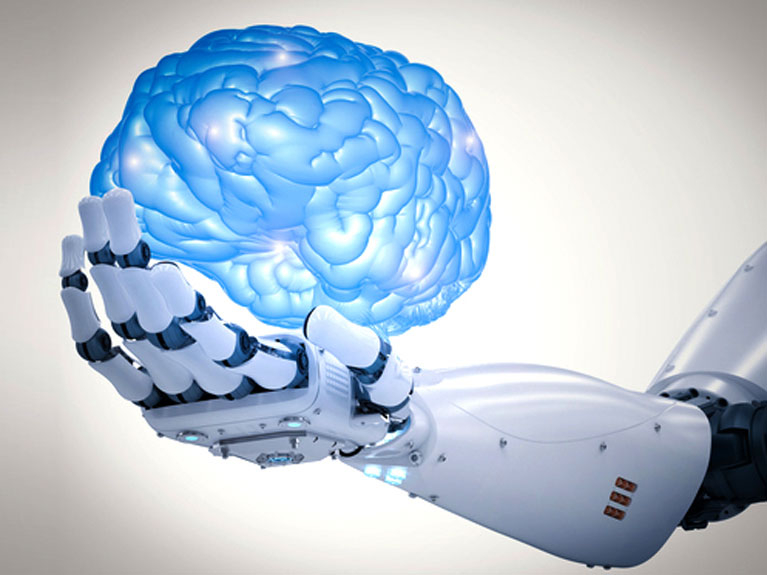Artificial Intelligence and the Society of the Future: 12 million euros of funding
The Volkswagen Foundation has approved a total of around 12 million euros for eight interdisciplinary and international research networks in the social and the engineering sciences that share an integrative focus on the field of artificial intelligence (AI) and society. The aim of this funding initiative is to strengthen interdisciplinary and trans-national research on socially responsible approaches to the further development of AI systems.
What opportunities are presented by AI? Where are the risks? And above all: What do new technologies mean for society – and for each and every one of us? The scientific community must also address questions such as these and consider not only the technical but also the ethical, moral and normative consequences of developments in AI. With its funding initiative "Artificial Intelligence and the Society of the Future", the Volkswagen Foundation has created a framework that enables the engineering and social sciences to pool their expertise in interdisciplinary research networks and, through such cooperation, bring about changes in per-spective that open up new insights and approaches to the further development of AI systems.
In the second round of funding, the Foundation's Board of Trustees approved 8 of the 17 research proposals submitted for this initiative. The interdisciplinary research groups bring together scientists from the fields of law, linguistics and the social sciences, as well as computer science, medicine, philosophy and cyber security. The projects are scheduled to run for three to four years and will each receive around 1.5 million euros in funding. They are focused on areas in which AI systems are already present or likely to be introduced in the future, such as health care, social welfare systems, urban and transport planning – as well as research surrounding misinformation and opinion formation in social media.
Overview of the eight approved projects
Explainable Intelligent Systems (EIS)
Disciplines: Computer science, philosophy, psychology and law
The project is about the explicability of AI-based decisions, and thus focuses on one of the key questions surrounding the use of AI systems in society.
Project participants:
Assist. Prof. Dr. Lena Kästner, Prof. Dr. Georg Borges, Prof. Dr. Ulla Wessels, Dr. Markus Langer, Prof. Dr. Holger Hermanns, all from the University of Saarland, and Prof. Dr. Eva Schmidt, TU Dortmund.
Reclaiming Individual Autonomy and Democratic Discourse Online: How to Rebalance Human and Algorithmic Decision Making
Disciplines: Psychology, computer science, educational research and cyber security
The research project focuses on targeted manipulation through the misinfor-mation spread via large internet platforms as well as on the development of transparent information architectures.
Project participants:
Prof. Dr Ralph Hertwig, Dr. Stefan Herzog, both Max Planck Institute for Human Development, Berlin; Prof. Dr Tina Eliassi-Rad, Northeastern University, Boston/USA; Prof. Stephan Lewandowsky, PhD, Prof. Dr Awais Rashid, both University of Bristol, Bristol/UK
Human-AI-Interaction in Healthcare: Identifying Factors Contributing to Clinical Utility
Disciplines: Psychology, computer science, medicine
The project focuses on the optimization of human-AI interactions in the healthcare sector, among other things in the sense of improving patient safety.
Project participants:
PD Dr Eva Lermer, Ludwig-Maximilians-Universität Munich; Dr Marzyeh Ghassemi, University of Toronto, Toronto/Canada; Dr Andreas Schicho, University Hospital Regensburg
Bots Building Bridges (3B): Theoretical, Empirical, and Technological Foundations for Systems that Monitor and Support Political Deliberation Online
Disciplines: Computer science, social sciences, psychology
The project aims to develop tools and methods for the identification and impact of manipulative "social bots" and to develop strategies for possible counter-measures to support the free formation of political opinion on the internet.
Project participants:
Prof. Dr. Philipp Cimiano, Prof. Dr. Elena Esposito, both University of Bielefeld; Dr. Robert Ackland, Australian National University, Canberra/Australia; Prof. Dr. Udo Seelmeyer, Bielefeld University of Applied Sciences; Prof. Dr. Tony Veale, University College Dublin, Ireland
Deliberation Laboratory (DeLab)
Disciplines: Social sciences, philosophy, sociology, linguistics
With the DeLab, the project aims at an AI intervention system with which con-structive, reasonable and responsible communication in social media can suc-ceed across cultural boundaries.
Project participants:
Dr. Valentin Gold, Georg-August-Universität Göttingen; Prof. Dr. John Parkinson, Maastricht University/Netherlands; Dr. Katarzyna Budzynska, Warsaw University of Technology, Warsaw/Poland; Prof. Chris Reed, Ph.D., University of Dundee, Dundee/United Kingdom; Dr. Annette Hautli-Janisz, University of Konstanz
Consequences of Artificial Intelligence for Urban Societies (CAIUS) Using Impact-Aware AI to Make Smart Cities Socially Equitable
Disciplines: Social sciences, computer science, information sciences
The project investigates the opportunities and risks for the use of intelligent systems in urban and transport planning.
Project participants:
Prof. Dr. Kai Eckert, Stuttgart Media University; Prof. Dr. Frauke Kreuter, Dr. Ruben Bach, Dr. Christoph Kern, Prof. Dr. Heiner Stuckenschmidt, all University of Mannheim
AI FORA – Artificial Intelligence for Assessment
Disciplines: Social sciences, sociology, computer science
The project investigates the status quo of AI-based social assessment underly-ing the distribution of public services. The findings should enable better AI tech-nologies for social welfare systems.
Project participants:
Prof. Dr. Petra Ahrweiler, Johannes Gutenberg University Mainz; Prof. Dr. George Kampis, German Research Centre for Artificial Intelligence GmbH, Kaiserslautern; Prof. Dr Elisabeth André, University of Augsburg, Prof. Nigel Gilbert, Ph.D., University of Surrey, Surrey/UK; Dr. Alexandra Penn, CECAN Centre for the Evaluation of Complexity Across the Nexus, Guildford/UK
Towards a Science of Curiosity
Disciplines: Computer science, educational research
The aim of the project is to understand how children explore their environment in order to implement this behavior in computer algorithms via a theory of child-like curiosity. This could lead to robots showing similar learning patterns.
Project participants:
Dr. Eric Schulz, Max Planck Institute for Biological Cybernetics; Dr. Georg Martius, Max Planck Institute for Intelligent Systems, Tübingen location;
Prof. Dr. Azzurra Ruggeri, Max Planck Institute for Human Development, Berlin
Further information on the Volkswagen Foundation's funding initiative "Artificial Intelligence and the Society of the Future" can be found under:
https://www.volkswagenstiftung.de/en/funding/our-funding-portfolio-at-a-glance/artificial-intelligence-and-the-society-of-the-future.

